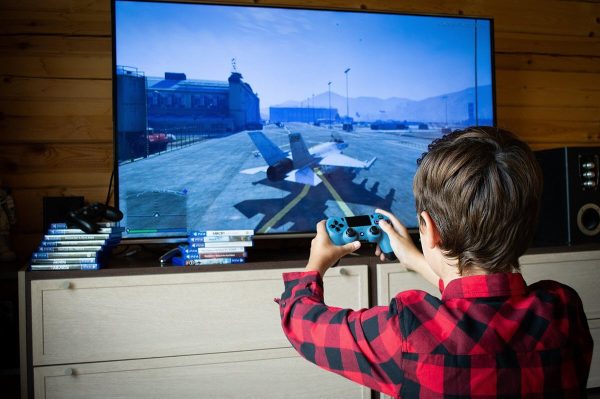Does Gaming Encourage Crime?

Estimated reading time: 5 minutes
Table of contents
In the wake of violent protests, many politicians and prominent media figures have alleged that violent video games encourage real-world criminal behavior.
Some research provides contradicting evidence. Some point that gaming leads to an increase in aggressiveness, while others point that gaming decreases criminality.
However, despite the slew of studies that attempt to string together evidence, there’s no evidence of a direct and causal link between heavy gaming and acting upon criminal offenses.
Let’s look into it in more detail.
Why is Gaming the Targeted Cause for Violent Behavior?
Debates surrounding video games and their effect on crime are contentious two-sided debates. Those who are in favor of blaming video games usually base their case on the assertion that this form of media encourages anti-social and violent behaviors within its digital environment.
And, to their support, some video games indeed carry themes of extreme violence and anti-social behaviors. Games depicting heinous war crimes, torture and gore, and other anti-social actions surround much of the mainstream pop media. And the only way it’s curbed is a mature or adults-only rating to prevent youth from playing these types of games.
But in a culture where one steps foot in an online server of a mature-rated video game and hears prepubescent-aged youth in voice calls, it’s not exactly difficult to realize that these preventative measures aren’t working as they should.
But the main question then becomes: does this accessibility to violent video games promote violence among the youth? And, to a more severe extent, crime?
Do Violent Video Games Actually Promote Crime?
Not exactly. A person can play video games all their lives, including those so-called violent types, and live a fairly average life. A kid can be exposed to the likes of Doom and Mortal Kombat in their childhood and remain a stable and contributing member of society as they age.
But if you reword the question slightly to, “Do violent video games promote aggression?”, then you’ll get a different answer.
According to psychologist Craig Anderson, “One study reveals that young men who are habitually aggressive may be especially vulnerable to the aggression-enhancing effects of repeated exposure to violent games.”
This implies that individuals who are predisposed to be aggressive may put themselves at risk of becoming more violent while playing violent video games.
To those who are frequently exposed to the multiplayer environment, this is no surprise. When was the last time you were mocked in a game of League of Legends? Dota 2? Counter-Strike?
Also, the recent trend of online multiplayer games that pit players against each other with guns and bullets have yielded a positive feedback loop: more exposure to aggressive behaviors yields more aggressive behaviors, which then feeds even more into playing these sorts of games.
But moving past the aggressive behavior, one has to ask, does this connote anti-social behavior towards the society at large? Or is it confined in an enclosed, artificial, online bubble?
SEE ALSO: 15 Ways You Are Being Rude With Your Cell Phone
Does Video Game Aggression Translate to Real-World Action?
Surprisingly, research in both directions has yielded conflicting results.
One study by Anderson and Dill (2000) showed that the number of hours playing video games was positively correlated to higher levels of aggression. Another study by Kutner and Olson (2008) shows that there’s no correlation between youth violence rates and violent video game sales.
A study by Ivory and Kalyanaraman (2013) showed that video games played a negligible role in violent, criminal offenses. Cunningham et. al also found that an increase in video game purchases by 1% led to a decrease in crime incidences by 0.03%.
So what gives? Why these conflicting results?
Well, for one thing, the methodology isn’t the most consistent. It’s not like you can sit down with a bunch of kids and ask how many hours they’ve played Grand Theft Auto. So instead researchers like to use violent crime rates as an approximate for video game violence exposure among youth populations.
In addition, a child who spends hours playing violent video games could have an increased tendency towards aggression, but that doesn’t mean that they will automatically act upon these urges. On the other hand, a child who spends hours playing passive video games like Tetris might not show increased aggression at all.
And of course, there’s also the problem of cause and effect: does violent video game exposure result in more aggressive behavior, or do already aggressive individuals prefer to play these games? It is impossible to conclude that one action causes the other. So at the current state, it’s impossible to conclude that there is a direct link between violent video games and real-world violence.
Takeaway
Yes, terrible crimes have been committed by individuals who play video games for hours on end, but these are almost always attributed to mental distress rather than an obsession with violent video games.
The video game military-obsessed person who killed 23 people in a Walmart in El Paso, Texas had a long history of mental distress and had posted anti-immigrant rhetoric online.
In these cases, it’s easy to see how mental distress can lead to violent behavior. But to pin the blame on video games, which are easily one of the most popular hobbies for children today?
That’s not fair.
To sum it up, no evidence has been found to directly link violent video games with increased aggression. Rather, such unfortunate events spring up from a complex mix of factors, from mental distress to easy access to firearms.








